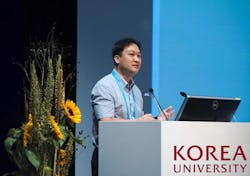Our Faces in Photonics series shines a light on scientists, researchers, and educators from all over the world whose work is reshaping the optics and photonics industry. This month, we are focusing on Myung-Ki Kim, an associate professor at Korea University’s Light Engineering Laboratory.
Laser Focus World: What inspired your career choice?
Myung-Ki Kim: A fascination with light and a desire to explore it. The attraction of light that I first encountered was the coexistence of its particle and wave properties, and this strange characteristic always encourages me to implement new creative optical devices. For example, photonic crystals with periodic dielectrics, surface plasmons with coupling light and electrons, and quantum computing with single photons have been great stimuli to develop new devices. My career choice of working with light is a great blessing and happiness to me.
LFW: Which research areas are you currently most interested in?
MK: Currently, I am focusing on two research areas. The first is the development of photonic integrated circuits on the nanometer scale, and the second is the development of quantum computing and communication through well-defined single photons and their entanglement. I believe the former will be a great next-generation alternative to current electronic integrated computers, and the latter will be a game changer for future computers.
LFW: Any intriguing things you’re seeing going on within optics/photonics right now?
MK: With remarkable advances in nanofabrication technology, it’s become possible to fabricate nanometer-sized structures that are much smaller than the wavelength of light. This technology has made it possible to create artificial optical materials with new properties beyond what nature allows, and we are now creating metamaterials—strange light materials. They can, for example, create materials with a negative index of refraction, invisibility cloaks that allow light to escape, and chiral materials that rotate light. This is a very interesting and groundbreaking thing because it can dramatically expand the limits of optical materials.
LFW: Any advice for anyone who wants to get into optics/photonics?
MK: My advice for anyone who wants to get into optics/photonics would be that they treat light as a toy they can have fun playing with. Light is a very great tool for arousing our curiosity. I look forward to seeing students play with light and unleash their creativity, all of which will play an important role in improving and enriching our society.
LFW: Favorite thing about your work?
MK: The favorite thing about my work is meeting people who do the same work, sharing diverse and attractive ideas, having heated discussions, and feeling a sense of accomplishment. Especially when I am alone, I love to let my imagination run wild.

Sally Cole Johnson | Editor in Chief
Sally Cole Johnson, Laser Focus World’s editor in chief, is a science and technology journalist who specializes in physics and semiconductors. She wrote for the American Institute of Physics for more than 15 years, complexity for the Santa Fe Institute, and theoretical physics and neuroscience for the Kavli Foundation.
